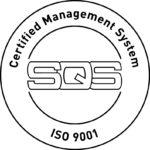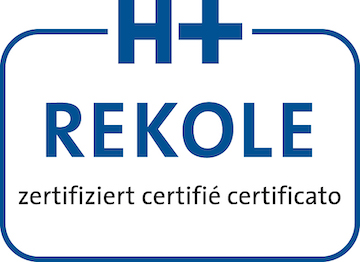Setting the foundation for your recovery
We support patients in their recovery from neurological diseases.
cereneo is one of the world’s leading rehabilitation providers for patients who are suffering from stroke, Parkinson’s disease, trauma and other diseases of the nervous system. A neurological disease or an accident are life changing events and can affect one or several of your brain functions, such as speech, movement, concentration and attention.
We provide a comprehensive and personalized rehabilitation programme that allows patients to get better in all areas. Continuous rehabilitation is a key success factor in the recovery process of each patient, this is why we accompany patients throughout the recovery process, from inpatient rehabilitation, transfer and therapy at home, as well as online therapy.
Stroke recovery at cereneo.
A stroke is a serious life-threatening medical emergency that happens when the blood supply is cut off to a part of the brain and can occur at any age and requires immediate medical attention. People who survive a stroke are often left with long-term functional impairments, but research indicates that early and more intensive post-stroke rehabilitation yields a quicker return to independent living. At cereneo, our focus is on helping you to regain lost abilities and to recover what is most important in your life.
Our neurologists and specialised movement, speech, swallowing and cognitive therapists design an individualised and intensive recovery programme that focuses on restitution – we are not simply teaching you to live with a disability. Nutrition scientists and rehabilitation nursing care complement our interdisciplinary science-driven approach. Together we help you get your life back and prevent further complications.
Parkinson's disease treatment in collaboration with leading experts.
Parkinson’s disease is a progressive and neurodegenerative disease that is characterized by motor and non-motor symptoms and has wide-reaching implications for patients and their families. A seamless and continuous support from a specialized neurologist is crucial for patients. Our specialists at cereneo accompany patients on their way from diagnosis and assessments, to recommendation of treatment pathways, inpatient rehabilitation, rehabilitation at home and long-term online rehabilitation and support.
At cereneo we tailor patients’ therapy programmes to their specific needs focusing on cognitive, neuropsychological, sleep, autonomic as well as sensory dysfunctions. We also do the fine adjustment of deep brain stimulators (DBS) and consecutive modifications to your medication.
For specific clinical interventions, such as DBS or focused ultra sound (FUS) we collaborate closely with the University Hospital of Zürich (USZ) and some of the world’s top specialists for Parkinson’s disease to positively affect the course of the disease.
Recovery after brain injury.
A brain injury is the result of a damage to your brain that may occur at any time. It affects each patient differently, common impairments can influence mobility, self-care, activities of daily living, emotion, cognition and communication. A traumatic or acquired brain injury has profound implications for the individual patient, family and society. At cereneo, we assess your resources and impairments to be able to focus on the areas you are having difficulty with and maximise your recovery.
Neurological conditions
we treat at cereneo.
brain injury
sclerosis (ALS)
disease
palsy
disorders
Barré-Syndrome)
Spastic Paraplegia
impairment
sclerosis
Dystrophy
Conditions
Conditions
nerve damage
Neuropathies
syndrome
impairment
/ Spinal Injuries
Balance Disorders
Innovative therapy concept.
Neurorehabilitation at cereneo aims at getting you back to a normal life without disabilities. Our interprofessional team of experts consisting of neurologists, therapists, precision engineers and nurses create a tailor-made therapy plan for each patient using the latest technologies and innovative treatment methods.
Regular assessments to measure your success allow for continuous therapy adjustments optimizing your training plan to speed up recovery.
Thanks to the integrated research team, latest studies and research results are available to our patients driving innovation and setting new standards of rehabilitation.


Unique interprofessional collaboration.
Your inpatient stay builds the foundation for a successful recovery. Depending on your medical condition and personal objectives, you can have back to back therapy sessions every day covering movement and occupational training, speech and language, as well as neuropsychological therapy units.
Our interprofessional team of experts consisting of neurologists, therapists, engineers and nurses works hand in hand with you, so you can get the most out of your inpatient stay putting your personal needs and objectives first and helping you go beyond your limits.
Neurologists
With their holistic view on each patient, our neurologists - together with the interdisciplinary team - develop and implement comprehensive rehabilitation plans using modern methods of diagnostic and interventions such as functional magnetic resonance imaging (fMRI), electroencephalography, electromyo/neurography, non-invasive brain stimulation (magnetic, electrical). They strive to find the best combination of treatment and medication, monitor progress and educate patients, family members and caregivers on how to support the patient to maximize restitution and recovery on all levels. Thanks to their experience and expertise, our neurologists are able to treat highly complex cases.
Movement therapy
Movement therapy combines physio- and occupational therapy. Its focus at cereneo lies on restoring and improving lost body functions and maintaining normal movement through systematic and specific exercises. By applying our therapy concept, the most effective treatment is used. Whenever indicated, robot-assisted therapies or stimulation techniques are applied in therapy, combined if necessary with non-invasive brain stimulation. Coupled with the individually tailored therapy programme with its high intensity, we achieve the maximum possible.
Therapy equipment upper extremities:
- Amadeo is a mechatronic finger and hand rehabilitation device, which specifically develops motor skills & mobility
- Armeo, a modular robotic arm and hand rehabilitation exoskeleton used in therapist-assisted training (ArmeoPower and ArmeoSpring)
- ArmeoSenso allows highly intensive arm therapy self-initiated, active, motivating and repetitive arm movement in a 3D workspace for patients with mild to moderate impairments
- DIEGO is a unique robot-assisted device for the rehabilitation of the upper extremities. Its three-dimensional therapeutic area and virtual reality promotes therapy progress and allows functional training
- MYRO is a touch screen offering a variety of games to train the movement of the arms through force control and touch applications
- PABLO is a sensor-based rehabilitation device for unilateral and bilateral training of hands, arms, shoulder and trunk, which allows training of pronation and supination as well as wrist extension and flexion
Therapy equipment lower extremities:
- Allegro leg press is a soft, robot-based training device to support strength, coordination and proprioception
- The BalanceMaster provides objective assessment and retraining of the sensory and voluntary motor control of balance
- The Balancetutor allows the therapist to create a postural perturbation such as a slip or a trip
- The innovative CAREN offers a high performance gait & balance training using advanced virtual & augmented reality, a 6 DOF motion base, and a high-performance split-belt treadmill
- C-Mill trains gait and balance to maximize performance. A treadmill training that simulates challenges in everyday life through augmented and virtual reality, with integrated assessments
- Erigo helps increase the tolerance to an upright or standing position and improving mobilisation using functional electrical stimulation integrated in the Erigo®Pro
- Humac Norm measures and improves human performance in rehabilitation. it allows for 22 isolated-joint movement patterns, 4 resistance modes (isokinetic, isotonic, isometric, and passive), and numerous reports to meet the measurement and exercise needs
- hunova is indicated for neurorehabilitation therapy providing the patient with core stability, muscle strengthening, coordination, postural control, balance and proprioception exercises
- Lokomat is a robotic gait trainer combined with a treadmill
- OMEGO Plus is a robotic device developed for the lower extremities and is often used in the early stage of rehabilitation
- Sensopro helps to train coordination, balance and strength
- Splitbelt treadmill is a specialized exercise device that consists of two separate belts moving at different speeds. It allows patients to engage in asymmetrical walking or running patterns, aiding in the rehabilitation and analysis of gait abnormalities
- ZeroG is a computer-controlled intelligent trolley system to allow free walking with constant continuous weight support
Water therapy helps to restore, improve or maintain mobility through systematic and targeted exercises in our therapy pool.
The Halliwick concept uses the hydrodynamic properties of water to force the patient to actively solve a motor control problem and is called water-specific therapy.
Rehabilitation engineering
Rehabilitation engineers develop technical solutions and devices that support patients in their therapy and measure the recovery process in greater detail. They observe patients during their daily activities and consult with treating physicians and therapists to find the best possible solutions. In collaboration with researchers, they can develop entirely new technologies or applications, while also tailoring existing technical devices or applications in the clinical environment to the needs of individual patients.
Speech and language therapy
Speech therapy concentrates on diagnostics, therapy and education in the following points: speech (aphasia), communication, speech and voice (dysarthrophonia), paralysis of the facial muscles (facial paresis) and swallowing (dysphagia). The creation of the individual therapy plan for speech therapy is based on the latest scientific findings and coupled with, e.g. non-invasive brain stimulation.

Neuropsychological therapy
Neuropsychology is concerned with various functions of the brain such as thinking ability (or intelligence), attention, memory, language ability, personality/behavioural changes, emotional disorders and visual perception disorders. After a standardized examination, an individual treatment plan is developed based on the latest scientific findings. The latest therapy material with individually tailored training is used in the therapy. Whenever indicated, non-invasive brain stimulation is used to achieve the best outcomes.
The driving simulator is used to retrain a patient’s driving ability after a stroke or traumatic brain injury.


Nursing
Our nursing team is trained in caring for the specific needs of our patients. They collaborate with the interdisciplinary team to develop individualized care plans and coordinate with physicians, therapists and other healthcare professionals to ensure continuity of care and implement appropriate interventions. They are also responsible for administering medication. Our nursing team assists patients in various rehabilitation activities, such as range of motion exercises, mobility training, and activities of daily living (ADL).
Nutrition science
Neurological patients often require a bespoke diet depending on their illness. The nutritionists work together with our patients to gradually adapt their diet in a way that promotes their recovery and long-term health. By assessing a patient's taste preferences, we aim to develop a nutritious, but also tasty, personalized meal for each individual patient. Food and recovery go hand in hand and gives both energy, nutrients and motivation, thus patients can reach their final goals.
Psychological counselling
Psychological support for patients and, in some cases, family members is an important part of the overall therapy and can have a significant impact on motivation and success during recovery. Motivation plays a crucial role in successful rehabilitation. Components of psychology include: motivation, learning relaxation techniques, hypnosis and sleep, as well as coping strategies.
Therapy units at cereneo are individual sessions allowing our therapists to focus on one patient at a time.
Non-invasive brain stimulation for greater and faster recovery.
Non-invasive brain stimulation (NIBS) is an innovative and safe treatment approach, where the brain is stimulated to increase the excitability of a selected part of the brain to improve language, movement or attention. When NIBS is combined with an intense and personalised rehabilitation programme, it can lead to greater and faster improvements in the therapy for various neurological conditions, such as stroke or spinal cord injuries or to treat deficits in language, attention and movement.
There are two approaches: TMS (Transcranial Magnetic Stimulation) is usually done directly before a therapy session and uses a weak magnetic field to stimulate a specific area of the brain. TDCS (Transcranial Direct Current Stimulation) uses weak electrical currents to stimulate the brain during the individual therapy session.
Innovation: real-time assessment, training & feedback in a VR environment with the CAREN.
CAREN is one of the most sophisticated therapy equipment in the world. It combines a treadmill that can be moved in all directions with 3D analysis of body movement and a virtual environment, all in real-time. The CAREN at cereneo, is the first and only one in Switzerland enabling the development and testing of customized training protocols that are tailored to the specific needs and goals of each patient.
Find answers to frequently asked questions:
cereneo stands for unique services – a great combination of state-of-the art and highly individualised neurorehabilitation and hospitality service at a 4 or 5-star level. cereneo provides you with all the necessary means to achieve the highest degree of independence possible. cereneo accompanies patients beyond the inpatient stay in a clinic with transfer at home and therapy at home with a cereneo therapist or online rehabilitation.
We treat various neurological conditions as part of a neurorehabilitation programme. You can find the complete overview of the conditions we provide rehabilitation for here.
During your stay, our team of professionals from multiple disciplines will always support you to achieve the goals you set at the beginning of your rehabilitation. Your personalised programme will be designed and regularly assessed to try to reach a maximum recovery. Our case managers will always be available to make your stay as comfortable as possible.
You or your family member contacts us. We receive your medical status and charts, which will be discussed internally by our medical team (taking into account privacy and data protection requirements). Based on your wishes and medical needs, we will send a personalised offer to fit your requirements. After accepting the offer, we take the necessary steps to organise your travel to and stay with us. You will arrive at cereneo, starting your neurorehabilitation recovery programme. During your stay at cereneo, you will have intensive and personalised therapy on a daily basis. Your progress will be regularly discussed by our medical team. Before completing the rehabilitation programme, we will discuss with you how we can best support you in your recovery journey going forward to ensure a seamless support and ongoing progress. We will support your transfer home and help you to continue your rehabilitation in your home environment on a daily basis or how to get started with online rehabilitation.
At cereneo, our main spoken languages are English, German, Russian, Arabic and French. Furthermore, we offer bilingual administration & translating services in various languages for our international patients. Our team is international, which means that different languages can be spoken with the patients and their families. If, nevertheless, translators with medical knowledge are desired on site, we can organise them within short notice. Translation services over the phone can also be organised spontaneously.
Most of the family members or other companions stay close to the patient, this could be in one of the accompanying hotels e.g. Park Hotel Vitznau or Campus Hotel Hertenstein. On request, we can make other arrangements. For more information about accommodation contact us directly via the contact form or call us +41 41 399 67 00.
Please send us the patient’s medical records so that we can forward that to our specialists for an assessment. Of course, all data is treated confidentially.
We recommend sending us your complete files (medical reports, laboratory results, CT or MRI files etc.). The more information we have the better. Our team will also send you a patient questionnaire to thoroughly assess your case.
All data can be sent to us by email: info@cereneo.ch
or by post to: cereneo Schweiz AG, Hertensteinstrasse 162, 6353 Weggis, Switzerland
Family members are always encouraged to join or visit our patients. Family cohesion can support the motivation of the patient immensely and might contribute positively to the recovery outcome. The involvement of someone’s social environment is important to us and considered to be a part of our therapy concept. If the patient agrees, we welcome family and friends and close acquaintances to help our patients recover. Our specialists will do everything to assess each case individually and provide advice, tips and guidance on how to support the patient during and after the therapy, e.g. in your home.
We are an international neurorehabilitation centre and we welcome patients from all around the world. At cereneo, there are many experts that will do everything possible to adjust your rehabilitation programme to your personal requirements and needs, always taking culture, language and food preferences into account as well.
For family and friends who support the patient during their stay, we also organize excursions and events, which can be related to everyday-life or hobbies for example. For patients, taking part in tours or hobbies can be an integrative part of therapy as well. On request, we also offer various other excursions and activities that have an active, cultural or simply recreational character.
We offer support with the organisation of your complete trip to and from the clinic and are happy to prepare everything to welcome you and your companions at cereneo. During your stay you will be hosted by our interprofessional team consisting of neurologists, therapists, nurses, nutritional experts, engineers, researcher and your dedicated case manager. After you have completed your inpatient rehabilitation programme, you can choose to be accompanied home by a cereneo Home therapist – making sure you are fully supported in your home environment. For more information on cereneo Home services click here.
Yes. Our case managers are dedicated to make the start of your rehabilitation programme as easy and convenient as possible. Over the years we have established good relationships with embassies, and we are familiar with the various visa requirements and the application process.
Everything we do is focused on enabling individuals with the knowledge, tools and technologies needed to recover, sustainably manage their health and rehabilitation as well as continue to pursue their personal ambitions. Our therapy concept is designed for patients to take control of their health and recovery, shorten the time in a hospital, provide tools and ideas to self-manage rehabilitation in daily life settings.
For an inpatient stay, therapy sessions usually start at 8.30 am with sessions of 30 to 60 minutes, depending on your abilities. You will have 1 on 1 (private) therapy sessions as defined by you supported by our neurologists.
Inpatient stays should last a minimum of 2 weeks, but this varies greatly on the progress and goals of each patient. The average stay of patients at cereneo is around 8 weeks. After the inpatient stay, you can continue your therapy at home with a cereneo Home therapist accompanying you or via online therapy.
All therapy sessions are individual one-to-one sessions. This allows the therapists to concentrate on your specific needs. If you like additional group sessions, we will look for other patients with matching therapy goals. However, because we have only small numbers of patients (11 in Vitznau, 23 in Hertenstein) this is rarely the case.
Doctors are available on call 24/7. Doctors’ rounds take place twice per week. Individual appointments with a doctor can always be scheduled, if you wish to discuss any particular aspect of your treatment or progress.
As our therapies and treatments are developed for the specific needs of each patient, costs vary largely depending on the required therapy and interventions as well as the level of nursing. People from outside of Switzerland can visit cereneo on a self-pay basis. However, we recommend to check with your health insurance for reimbursement.
If you could not find the answer to your question, feel free to call us +41 41 399 67 00 (8am to 5pm) or Contact US
We accompany you on your entire recovery journey
No matter where you are in your recovery process, we are can support you to maximise your health.

Inpatient Rehabilitation
A fully personalised therapy programme based on your needs and wishes in one of your clinics.

Transfer to
your home
Assessment of your home environment and safe transition back to anywhere in the world.

Rehabilitation
at home
Together with a cereneo Home therapist you start your rehabilitation at home and integrate it in your daily routine.

Online
Rehabilitation
Continue your rehabilitation at home via online channels and stay connected to the clinical expertise and network of cereneo.

